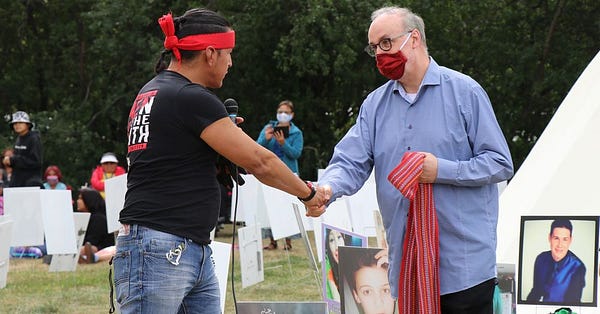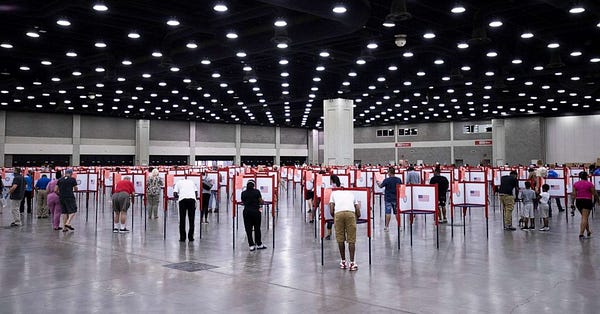Putting the "Me" in Merit
Loss Leader #6: Quotas, False Idols, Falling Empires and a little bit of Lacrosse.

At the end of her 2018 Oscar acceptance speech for Best Actress, Frances McDormand said “I’ve got two words for you: inclusion rider.”
An inclusion rider is a contractual demand from an actor or actress requiring a certain level of diversity among a film’s cast and crew, a means to propel change by leveraging the power of individual stardom.
Quota systems, whether they’re suggested by politicians or William’s mom from Almost Famous, have a way of making certain folks set their hair on fire, but the idea of setting standards for representation is increasingly gaining traction among thoughtful leaders as diversity trends lag despite the ample and compelling evidence.
Last week, the Academy Awards introduced Representation and Inclusion Standards for consideration in the Best Picture category. Designed to be “a catalyst for long-lasting, essential change” the Standards will require Best Picture hopefuls to submit their achievements against four categories of inclusion; On-screen Representation, Themes And Narratives; Creative Leadership and Project Team; Industry Access and Opportunities: Audience Development.

Best Actress in the Category of Impersonating Frances McDormand
Understanding that blunt force often proceeds backlash, the new requirements are smartly rolled out: award hopefuls will have to report against these standards for the next two years, but they will not become an official qualifier until 2024. And, most notably, contenders will have to satisfy only two of the four categories, allowing filmmakers to still tell the story of one demographic or ethnically specific protagonist, while still achieving progress against, say, industry access and project teams.
In 2017, we made a pledge in the Toronto Mayor’s Office committing to only attend technology events with a diversity of representation. We didn’t set a quota, but demanded that effort must be made to ensure the diversity of Toronto’s tech sector was represented in the agenda, speakers or attendees of an event. This came after countless invitations to attend all white, all male events, the organizers of which would quickly claim a pipeline problem: that there were no women identified or racialized attendees who could come.
Increasingly, other groups are starting to introduce similar systems, belying these false justifications for exclusion and prioritizing the economic and governance advantages that diversity has been shown to have. Venture capitalists and investors are beginning to require that the companies they invest in demonstrate inclusive practices, and Canadian technology company Diversio is working to become the LEED certification tool for ensuring companies avoid the financial risk of ongoing failure to diversify.
Still, there are those who will start screaming about merit in the face of quotas. That they will punish talent. That hard work and brilliance will get you all the advancement, board seats and Oscars you deserve.
This suggests that the current state rewards people through merit alone, and not because of clear systemic advantage.
The idea that quotas are unjust suggests that the current lack of diversity is justified.
The idea that those who are included as a result of quotas are tokens implies that they will be unable to prove themselves valuable.
Quotas shift the onus away from the underrepresented to prove their worth. We have plenty of rules and regulations to protect people, to ensure fairness, to propel growth and opportunity in the right measures, to save us from ourselves.
Unconvinced? Spurred by the fact that women are still dramatically underrepresented in corporate C-suits and boards, The Institute for Gender and the Economy hosted a policy debate in 2017 to see if quotas were really as scary as people thought.
Were they?
To quote McDormand once again, “The only power you have is the word no.”
Putting the ‘Oh’ in Trope
Why do we believe the things we do about the workplace? About leadership? What are the ideas that provide the foundation of our beliefs about what success looks like? And what if they’re proven to be harmful BS?
There comes a time where the canon of our leadership assertions needs to be analyzed, taken apart, challenged, weighed against additional context, measurable evidence and new information before being reintegrated into our thinking.
The New York Times did a brilliant job last weekend of taking apart economist Milton Friedman’s 1970 essay “The Social Responsibility of Business is to Increase Its Profits.”

The special section includes 2020 hindsight analysis of Friedman’s work from a wide array of experts, including the CEOs of Starbucks and Salesforce, pointing out the flawed thinking that absolves companies from responsibility for anything beyond their shareholder profits, and the idea that short term gains trump long term pain.
“I didn’t agree with Friedman then, and the decades since have only exposed his myopia,” said Marc Benioff.
The careful and comprehensive analysis of ideas like this is increasingly necessary, and should be applied to all kinds of tropes that have been internalized and harmfully applied, including catchphrases like “Move fast and break things” and “Snitches get Stitches.”
You don’t always need a NYT special section. Sports commentator Skip Bayless had his ass rightfully handed to him last week for trotting out the dangerous trope that leaders shouldn’t demonstrate weakness, when he criticized Dallas Cowboys QB Dak Prescott for discussing the mental health challenges he faced after his brother’s suicide.
Dereliction of Duty
Not to put too fine a point on, you know, the impending collapse of US democracy and impending Civil War, but way more people in positions of authority should be speaking up about this.
Quick Leads
A Regina judge ruled it was unconstitutional to prevent Tristan Durocher from camping on the lawn of the Saskatchewan Legislature as part of his call for greater attention and funding for suicide prevention. “I believe I can take judicial notice of recent and significant efforts to nudge Indigenous and non-Indigenous people along the road to national reconciliation … In my respectful view, Tristen’s ceremonial fast represents an admittedly small and personal attempt to encourage all of us to move a little further along in our national journey.”
Eight teams were selected to participate in the Lacrosse 2020 World Games, and Native American team the Iroquois Nationals qualified in third place, only to be initially declared ineligible because they don’t represent a sovereign nation or have an Olympic Committee. The organizing body recently said they would reverse the decision if another team agreed to drop out. Cue Ireland Lacrosse, whose CEO said, "It's simply the right thing to do.”

Some towns, cities and regions are experimenting with local currencies, feeding their own money into their economies as a way to help those in need and drive local consumption.
More US companies are stepping up to pay employees who serve as poll workers in the November election.
Warriors coach Steve Kerr supercut offers a Masterclass in how to manage talent.















